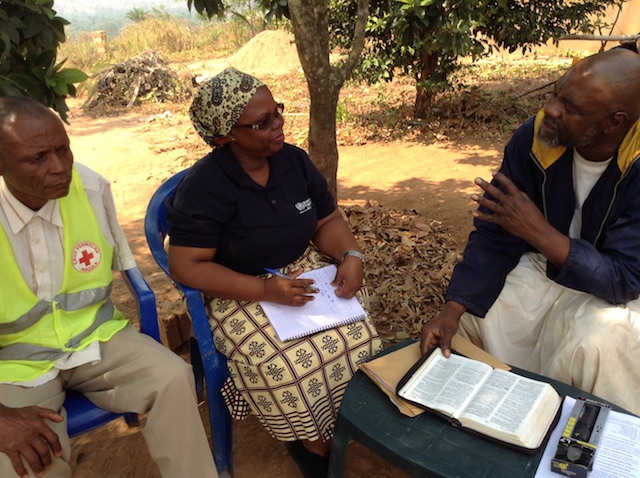From refusal to promotion: Religious leaders in Lunda Norte, Angola agree to advocate for yellow fever vaccination
 The district health authorities, WHO and the Red Cross on 19 June 2016, met with leaders of one religious group based in Estufa neighbourhood, Chitato district, Lunda North province to explain the importance of yellow fever vaccination in protecting members of their communities from the disease.
The district health authorities, WHO and the Red Cross on 19 June 2016, met with leaders of one religious group based in Estufa neighbourhood, Chitato district, Lunda North province to explain the importance of yellow fever vaccination in protecting members of their communities from the disease.
The religious group is known for refusing any kind of medical assistance including vaccination. In the first encounter, the religious leaders resisted vaccination on the basis of biblical teachings. However following discussions between WHO and the pastors during which WHO’s mission was explained as Ensuring that all people stay healthy, a common ground was reached. WHO also helped the pastors define the meaning of health as “a state of complete physical, mental and social well-being and not merely the absence of disease or infirmity.” The group’s religious leader, Abel Moisés concluded that both the partners and they shared the same mission.
“In accordance with our faith, believers may be vaccinated,” said Moisés.
Moisés proceeded to orient the church members on the benefits of yellow fever vaccination, which they accepted to take. Among those who later went to seek vaccination was a pastor from the group. Since then 711 people have been vaccinated in this community.
The social mobilization team then visited three other churches and requested its religious leaders to share information on the benefits of yellow fever vaccination with the congregation. This helped to mobilize church members for vaccination at the nearby booth.
“Collaborating with religious leaders is a priority for WHO because of their influence in the community.” said Dr Hernando Agudelo, WHO Representative Angola. “By bringing religion and health together, we are able to properly inform communities and mobilize them to protect themselves in order to stop yellow fever in its tracks.”
Vaccine refusal puts members of the community at risk of the country’s yellow fever outbreak. To date 861 cases of yellow fever cases have been confirmed in Angola since December 2015.
Emergency campaign in Lunda Norte and border areas
A total of 175 874 people have been vaccinated in the recent vaccination campaign in Chitato district. Since the beginning of the outbreak, 21 yellow fever cases have been confirmed in Lunda Norte province. The province not only shares a border with DR Congo, but is also an area with high population movement making it a priority area for vaccination to prevent further international spread.
Additional emergency vaccination campaigns are set to begin along the Democratic Republic of Congo and Angola boarders to create an immune buffer. Specifically, within a 75-100km belt spanning the border between Angola and the DR Congo and targeted health zones/communes at risk.
Yellow fever outbreak in Angola
The Yellow fever outbreak was first confirmed in Angola on 19 January 2016 by laboratories at the National Institute for Communicable Diseases in South Africa. Nine days later on 29 January, the Angolan Ministry of Health requested vaccines from the global stockpile for yellow fever emergencies. The request was approved and the country started a massive vaccination campaign on the 3 February 2016.
Suspected cases have been reported in all provinces, and confirmed cases have been reported in 16 of the 18 provinces and 78 of 121 reporting districts.
Mass vaccination campaign first began in Luanda and has now been expanded to cover most of the other affected parts of the country. Recently the campaigns have focused on border areas, including Lunda Norte. Despite extensive vaccination efforts circulation of the virus persists.
Stockpile
Since the declaration of the outbreak, Angola has made several additional requests for vaccines from the emergency stockpile and by 18 May, the country had received 11.7 million doses in total.
_________________________________________________
For more information, please contact:
Dalia Lourenco, Communications Officer, WHO Angola, Phone: +244 9431 78227, Email: dalia.lourenco.levin [at] gmail.com (dalia[dot]lourenco[dot]levin[at]gmail[dot]com)


